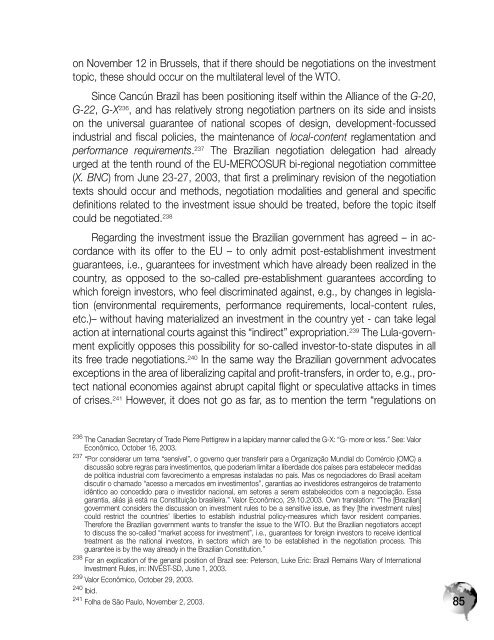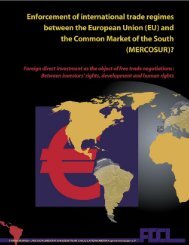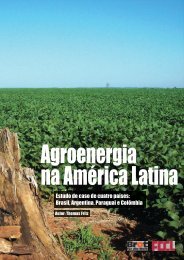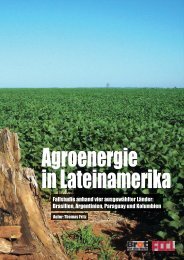(EU) and the Common Market of the South (MERCOSUR)? - FDCL
(EU) and the Common Market of the South (MERCOSUR)? - FDCL
(EU) and the Common Market of the South (MERCOSUR)? - FDCL
You also want an ePaper? Increase the reach of your titles
YUMPU automatically turns print PDFs into web optimized ePapers that Google loves.
on November 12 in Brussels, that if <strong>the</strong>re should be negotiations on <strong>the</strong> investment<br />
topic, <strong>the</strong>se should occur on <strong>the</strong> multilateral level <strong>of</strong> <strong>the</strong> WTO.<br />
Since Cancún Brazil has been positioning itself within <strong>the</strong> Alliance <strong>of</strong> <strong>the</strong> G-20,<br />
G-22, G-X 236 , <strong>and</strong> has relatively strong negotiation partners on its side <strong>and</strong> insists<br />
on <strong>the</strong> universal guarantee <strong>of</strong> national scopes <strong>of</strong> design, development-focussed<br />
industrial <strong>and</strong> fiscal policies, <strong>the</strong> maintenance <strong>of</strong> local-content reglamentation <strong>and</strong><br />
performance requirements. 237 The Brazilian negotiation delegation had already<br />
urged at <strong>the</strong> tenth round <strong>of</strong> <strong>the</strong> <strong>EU</strong>-<strong>MERCOSUR</strong> bi-regional negotiation committee<br />
(X. BNC) from June 23-27, 2003, that first a preliminary revision <strong>of</strong> <strong>the</strong> negotiation<br />
texts should occur <strong>and</strong> methods, negotiation modalities <strong>and</strong> general <strong>and</strong> specific<br />
definitions related to <strong>the</strong> investment issue should be treated, before <strong>the</strong> topic itself<br />
could be negotiated. 238<br />
Regarding <strong>the</strong> investment issue <strong>the</strong> Brazilian government has agreed – in accordance<br />
with its <strong>of</strong>fer to <strong>the</strong> <strong>EU</strong> – to only admit post-establishment investment<br />
guarantees, i.e., guarantees for investment which have already been realized in <strong>the</strong><br />
country, as opposed to <strong>the</strong> so-called pre-establishment guarantees according to<br />
which foreign investors, who feel discriminated against, e.g., by changes in legislation<br />
(environmental requirements, performance requirements, local-content rules,<br />
etc.)– without having materialized an investment in <strong>the</strong> country yet - can take legal<br />
action at international courts against this “indirect” expropriation. 239 The Lula-government<br />
explicitly opposes this possibility for so-called investor-to-state disputes in all<br />
its free trade negotiations. 240 In <strong>the</strong> same way <strong>the</strong> Brazilian government advocates<br />
exceptions in <strong>the</strong> area <strong>of</strong> liberalizing capital <strong>and</strong> pr<strong>of</strong>it-transfers, in order to, e.g., protect<br />
national economies against abrupt capital flight or speculative attacks in times<br />
<strong>of</strong> crises. 241 However, it does not go as far, as to mention <strong>the</strong> term “regulations on<br />
236 The Canadian Secretary <strong>of</strong> Trade Pierre Pettigrew in a lapidary manner called <strong>the</strong> G-X: “G- more or less.” See: Valor<br />
Econômico, October 16, 2003.<br />
237 “Por considerar um tema “sensível”, o governo quer transferir para a Organização Mundial do Comércio (OMC) a<br />
discussão sobre regras para investimentos, que poderiam limitar a liberdade dos países para estabelecer medidas<br />
de política industrial com favorecimento a empresas instaladas no país. Mas os negociadores do Brasil aceitam<br />
discutir o chamado “acesso a mercados em investimentos”, garantias ao investidores estrangeiros de tratamento<br />
idêntico ao concedido para o investidor nacional, em setores a serem estabelecidos com a negociação. Essa<br />
garantia, aliás já está na Constituição brasileira.” Valor Econômico, 29.10.2003. Own translation: “The [Brazilian]<br />
government considers <strong>the</strong> discussion on investment rules to be a sensitive issue, as <strong>the</strong>y [<strong>the</strong> investment rules]<br />
could restrict <strong>the</strong> countries’ liberties to establish industrial policy-measures which favor resident companies.<br />
Therefore <strong>the</strong> Brazilian government wants to transfer <strong>the</strong> issue to <strong>the</strong> WTO. But <strong>the</strong> Brazilian negotiators accept<br />
to discuss <strong>the</strong> so-called “market access for investment”, i.e., guarantees for foreign investors to receive identical<br />
treatment as <strong>the</strong> national investors, in sectors which are to be established in <strong>the</strong> negotiation process. This<br />
guarantee is by <strong>the</strong> way already in <strong>the</strong> Brazilian Constitution.”<br />
238 For an explication <strong>of</strong> <strong>the</strong> genaral position <strong>of</strong> Brazil see: Peterson, Luke Eric: Brazil Remains Wary <strong>of</strong> International<br />
Investment Rules, in: INVEST-SD, June 1, 2003.<br />
239 Valor Econômico, October 29, 2003.<br />
240 Ibid.<br />
241 Folha de São Paulo, November 2, 2003.<br />
85









